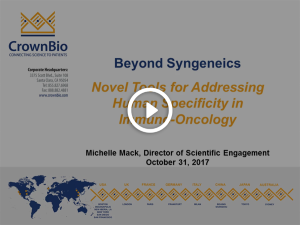On Demand Webinar
Beyond Syngeneics – Novel Tools for Addressing Human Specificity in Immuno-Oncology
Presented by Michelle Mack

Checkpoint inhibitors such as anti-PD-1, anti-PD-L1, and anti-CTLA-4 have revolutionized immunotherapy, and are now approved for a range of cancer types. Their preclinical evaluation is hindered, however, by a lack of available in vivo models for testing human-specific therapeutics.
Syngeneic mouse models with functional murine immunity are available; however, these have limited use if the candidate drug has no mouse ortholog. This webinar will introduce novel tools for investigating human specificity in immunocompetent mice. These models, with humanized checkpoint inhibitors, were created via CRISPR/Cas9 gene editing, with murine T cells expressing chimeric human/murine PD-1, CTLA-4, OX40, CD137, or TIM-3. The platform is complemented with syngeneic models with humanized ligands expressed on the mouse cancer cells. For example, the MC38 syngeneic model expressing hPD-L1. We will discuss the validation data to confirm human PD-L1 is expressed on the cells, and reliable TGI response when treated with a range of anti-hPD-L1 antibodies and how to apply them to your future studies.
Watch This Webinar To Learn:
- How humanized drug target models overcome the donor variability of HSC-humanized mouse models
- How to optimize your efficacy studies for human-specific therapeutics
- How to apply tools to evaluate the efficacy of agents targeting proteins expressed on tumor cells e.g. PD-L1
Watch Now!
About The Presenter
 Michelle Mack, Director of Scientific Engagement at Crown Bioscience, brings 15 years of previous oncology R & D experience from Pfizer, where she was a Senior Scientist in the Oncology Research Unit and served as a research project leader on oncology therapeutic programs. At Pfizer, she led cross-functional teams exploring approaches that included: small-molecule inhibitors, antibody drug conjugates, and nanoparticle based therapeutics. Michelle’s scientific expertise spans the preclinical and translational space for multiple solid and hematological tumor indications. Throughout her professional career, Michelle has worked in oncology, immunology and immuno-oncology therapeutic areas. She has several high-impact peer-reviewed publications and has led discussions at multiple scientific conferences. Michelle obtained her undergraduate degree from Rochester Institute of Technology, Rochester, NY. She then received her M.S. in microbiology and is currently completing her Ph.D. in molecular biology from Seton Hall University.
Michelle Mack, Director of Scientific Engagement at Crown Bioscience, brings 15 years of previous oncology R & D experience from Pfizer, where she was a Senior Scientist in the Oncology Research Unit and served as a research project leader on oncology therapeutic programs. At Pfizer, she led cross-functional teams exploring approaches that included: small-molecule inhibitors, antibody drug conjugates, and nanoparticle based therapeutics. Michelle’s scientific expertise spans the preclinical and translational space for multiple solid and hematological tumor indications. Throughout her professional career, Michelle has worked in oncology, immunology and immuno-oncology therapeutic areas. She has several high-impact peer-reviewed publications and has led discussions at multiple scientific conferences. Michelle obtained her undergraduate degree from Rochester Institute of Technology, Rochester, NY. She then received her M.S. in microbiology and is currently completing her Ph.D. in molecular biology from Seton Hall University.


 Michelle Mack, Director of Scientific Engagement at Crown Bioscience, brings 15 years of previous oncology R & D experience from Pfizer, where she was a Senior Scientist in the Oncology Research Unit and served as a research project leader on oncology therapeutic programs. At Pfizer, she led cross-functional teams exploring approaches that included: small-molecule inhibitors, antibody drug conjugates, and nanoparticle based therapeutics. Michelle’s scientific expertise spans the preclinical and translational space for multiple solid and hematological tumor indications. Throughout her professional career, Michelle has worked in oncology, immunology and immuno-oncology therapeutic areas. She has several high-impact peer-reviewed publications and has led discussions at multiple scientific conferences. Michelle obtained her undergraduate degree from Rochester Institute of Technology, Rochester, NY. She then received her M.S. in microbiology and is currently completing her Ph.D. in molecular biology from Seton Hall University.
Michelle Mack, Director of Scientific Engagement at Crown Bioscience, brings 15 years of previous oncology R & D experience from Pfizer, where she was a Senior Scientist in the Oncology Research Unit and served as a research project leader on oncology therapeutic programs. At Pfizer, she led cross-functional teams exploring approaches that included: small-molecule inhibitors, antibody drug conjugates, and nanoparticle based therapeutics. Michelle’s scientific expertise spans the preclinical and translational space for multiple solid and hematological tumor indications. Throughout her professional career, Michelle has worked in oncology, immunology and immuno-oncology therapeutic areas. She has several high-impact peer-reviewed publications and has led discussions at multiple scientific conferences. Michelle obtained her undergraduate degree from Rochester Institute of Technology, Rochester, NY. She then received her M.S. in microbiology and is currently completing her Ph.D. in molecular biology from Seton Hall University.
